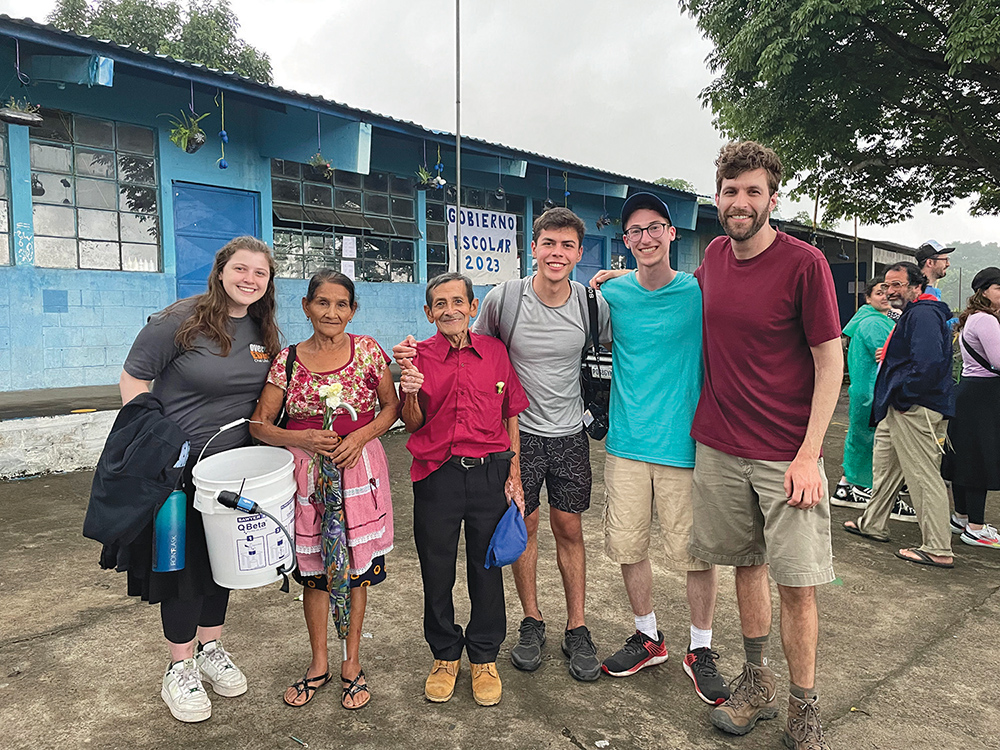By Sophie Dubin

I just returned from the Torat Adam Summer Experience (TASE), a unique Yeshiva University program to Guatemala and El Salvador designed to discover our potential and strengthen our career competencies while encountering individuals and communities very different from ourselves. Many words come to mind such as unforgettable, inspiring, adventure and connection. Although the trip was only 12 days, my 34 peers and I saw and did so much. I am so grateful that we were able to travel to many different places and interact meaningfully with the Jewish and general communities.
It’s hard for me to pinpoint a favorite moment since I had so many that will stick with me forever. We received an exceptionally warm welcome from the main shul in Guatemala City, where we spent our first Shabbat, but for me my favorite place was Chabad in Antigua. Antigua itself is colorful and mesmerizing, and I feel very connected to Chabad because I became a baalat teshuva through them. (I soon discovered that one of the trip’s staff members and at least one other student also reconnected with our heritage through Chabad.)
Every single place that we visited, we were welcomed with open arms, smiles and hugs. Every person was so grateful to us just for visiting them and talking to them even if we couldn’t necessarily understand each other language-wise. I have never met people so grateful and happy to be with other Jewish people with whom they have never interacted with before.
When I became religious, one of the things that I missed was being able to try traditional foods when I travel. It was really amazing that on this trip we were able to find Jewish communities that cooked kosher traditional dishes for us so we were really able to fully experience and immerse ourselves in their country and connect with the culture.
Something that surprised me was seeing all the American stores such as Forever 21 and Old Navy and fast-food restaurants like McDonalds, Wendy’s, Starbucks and Taco Bell. It’s pretty ironic that they have a Taco Bell in a Latin country that probably can make much better tacos than a fast-food restaurant!
I was struck by the juxtaposition between life and death. For instance, at the Jewish cemetery we visited in Guatemala (unfortunately, the Orthodox community in El Salvador cannot afford a cemetery), there were graves with grass and flowers growing from them. I felt like this was a beautiful metaphor for the circle of life and how life can grow from death. Also, when we climbed one of Guatemala’s active volcanoes, I was not expecting there to be any plants or wildlife. However, growing alongside the volcanic rocks, there were also many trees and plants. I was surprised that vegetation was able to grow on that type of soil and in that environment. This also demonstrates the metaphor and shows how life can still thrive after destruction and despair just like we witnessed as we visited communities that had regrouped and rebuilt after Guatemala’s devastating eruption a few years ago. We brought a clean supply of water to one of these places and this will literally enable life to continue to flourish there.
During orientation, our program leader, Rabbi Daniel Coleman, challenged us to cultivate several of the eight nationally recognized (NACE) career competencies while on this trip. I chose Global Intercultural Fluency, which has to do with understanding different cultures and perspectives. This immersive experience enabled us to get to know people from other countries and taught me a lot about their lives and the choices available to them and to us. I aspire to become a child life specialist and am confident that these experiences will help me in the workplace to take into account different cultures and perspectives and support and understand the decisions they make. I feel grateful that there are so many resources and opportunities for health care here. In conjunction with my career, I would love to be able to travel to different countries every once in a while to help out in medical clinics like we did during this trip.
One moment that reinforced my chosen career was connecting with Mishel, a pediatrician and El Salvador’s only Jewish physician, who joined and hosted us at several points in our trip. She shared some of her experiences and how she helps children as a palliative care specialist, one of just three in the country. Although not the same as a child life specialist, I found that the roles are aligned and aim to achieve similar goals. As a result of this exposure, I decided that during the process of becoming a child life specialist I will see if there are any palliative care courses that I can take to supplement my learning. Being able to observe Dr. Mishel working in a makeshift “pop-up” clinic behind a church off a dirt path near the town of Suchitoto was an amazing experience. It showed me that especially in areas where there are minimal healthcare resources, compassion can be the primary driver of care.
A rising YU senior from Baltimore, Sophie Dubin is majoring in psychology and minoring in studio art. She is the captain of the women’s soccer team and enjoys learning more about different cultures and being able to meet people who have a range of different life experiences.











